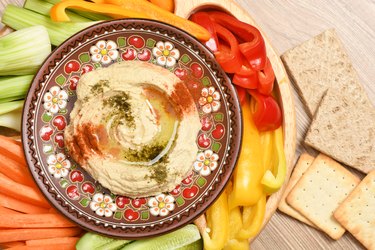
Hummus is a spread made from chickpeas, also called garbanzo beans, that can be a tasty treat. Paired with some veggies for dipping, it can be a healthy snack, too. But for people with irritable bowel syndrome (IBS), hummus may cause stomach problems.
"Hummus can cause gas, bloating and possibly diarrhea in people who are sensitive to beans," says Elena Ivanina, DO, a gastroenterologist at Lenox Hill Hospital in New York City. "Many people don't make enough of a certain enzyme, called alpha-galactosidase, to fully digest beans like chickpeas."
Video of the Day
Video of the Day
Read more: 11 Foods to Avoid When You Have IBS
All About Hummus
Dr. Ivanina describes hummus as a terrific source of fiber. In fact, hummus contains soluble and insoluble fiber. Insoluble fiber bulks the stool, which means that hummus helps you poop. Soluble fiber helps you have a healthier microbiome — that's the community of microbes that live in your intestines.
If you're a fan of hummus, Dr. Ivanina recommends drinking plenty of fluids when you're boosting your fiber intake to keep your digestive system moving. Hummus is such a healthy food that it's OK to eat it every day, though she says that's not your best plan.
"Hummus is a great source of fiber and protein, but it's best to eat a varied diet with different types of beans and other healthy foods," she suggests.
Note, too, that if you ramp up the amount of fiber you eat quickly, you may experience some temporary digestive problems, such as gas or bloating. It's also possible that your body can't process the enzyme alpha-galactosidase.
"That is why people find Beano so helpful," Dr. Ivanina says. "It breaks down the enzyme in beans to make them more digestible." Beano and other brands of alpha-galactosidase are available over the counter as a dietary supplement.
Hummus and IBS
Food intolerances and sensitivities can be a cause of irritable bowel syndrome, says the National Institute of Diabetes and Digestive and Kidney Diseases (NIDDK), and eating certain foods can trigger the symptoms of IBS in some people. Other things associated with IBS are bacterial infections, excess stress and certain mental health conditions, but doctors don't know for sure what the actual cause of IBS is.
The most common symptoms of IBS include abdominal pain and changes in bowel movements, NIDDK says. Limiting or eliminating triggering foods can sometimes help relieve IBS symptoms, the University of Pittsburgh Medical Center (UPMC) reports.
Foods containing certain substances, known as FODMAPs, may be a problem for people with IBS, according to NIDDK. FODMAP is the acronym for fermentable oligosaccharides, disaccharides, monosaccharides and polyols.
NIDDK says FODMAPs include:
- Foods with some artificial sweeteners.
- Foods made from wheat or rye.
- Honey and foods containing high-fructose corn syrup.
- Dairy products including milk, soft cheeses, yogurt and ice cream.
- An array of fruits (apples, apricots, cherries, nectarines, pears, plums and watermelon) and juices from these fruits.
- An assortment of vegetables (artichokes, asparagus, cabbage, cauliflower, garlic, mushrooms, onions and snow peas).
Beans are also considered FODMAP foods, says NIDDK, and that includes chickpeas.
"People with IBS can be sensitive to high-FODMAP foods," Dr. Ivanina says, adding that following a low-FODMAP diet may improve symptoms for people with IBS.
If hummus is one of those foods that you just have trouble tolerating, Dr. Ivanina suggests instead eating tofu, quinoa, low-FODMAP fruits and veggies and mixed nuts.
Track Your Food
A good way to identify your troublesome foods is to keep a food diary, suggests UPMC. Write down what you eat, what you're doing, the emotions you're feeling, and what symptoms you get after eating those foods.
Doing this consistently should yield clues as to what foods create problems for you. And, by tracking your emotions, too, can be a good way to see if stress plays a significant role in your IBS symptoms, says UPMC.
- Elena A. Ivanina, DO, gastroenterologist, Lenox Hill Hospital, New York City
- National Institute of Diabetes and Digestive and Kidney Diseases: "Eating, Diet, & Nutition for Irritable Bowel Syndrome"
- National Institute of Diabetes and Digestive and Kidney Diseases: "Symptoms & Causes of Irritable Bowel Syndrome"
- University of Pittsburgh Medical Center: "Irritable Bowel Syndrome: Controlling Symptoms With Diet"
Is this an emergency? If you are experiencing serious medical symptoms, please see the National Library of Medicine’s list of signs you need emergency medical attention or call 911.